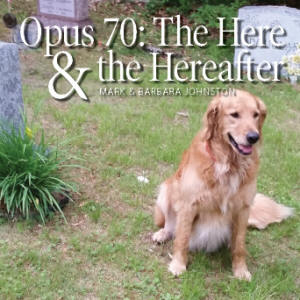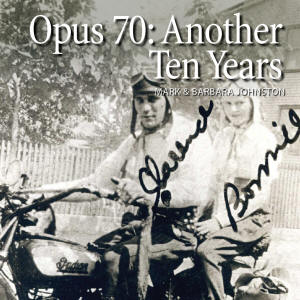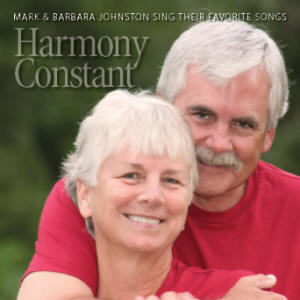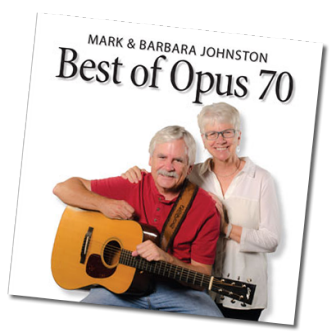
Best of Opus
70 Liner Notes

As a songwriter, I sometimes feel that every song is a
love song.
Jack’s Song is a love
song to our daughter’s Golden Retriever who is my companion on morning
walks when visiting Plymouth, Massachusetts. The walk takes us along the
historic waterfront, through Brewster Gardens, by the grist mill at
Jenney Pond and along Town Brook. The final leg of the walk is through
Vine Hills Cemetery where there is plenty of room to let Jack off the
leash. He doesn’t always treat the historic gravestone monuments with
the utmost respect. The original title was
Monumental Indignity but
everyone who has heard it calls it
Jack’s Song.
As New England expatriates living in Florida, we
sometimes have to head out to a sports bar on Sunday afternoon in order
to catch the Patriots football game. We discovered a ritualistic, if not
spiritual, sense of place.
Sunday Afternoon Mass
comes out of that experience.
My songwriting catalog is called
Opus 70 because I was well
into my 60’s before I started writing songs and the subject matter for
most is about getting older. We like to call it a “sideways look” at
aging.
Better to Be Seen Than Viewed
is Opus 70: Number 1. The
summer I wrote the lyrics, I did not have my guitar with me and I sent
the song to Peter Lehndorff – a friend and experienced songwriter – to
see if he might want to craft a suitable tune. He did.
As I grew older, I noticed that the medicine cabinet
of my college days had somehow expanded. What was once a single bottle
of aspirin – for the days when a little “hair of the dog” was not a
suitable cure – had become a supply of prescription and over-the-counter
meds that spilled out of the medicine cabinet into bathroom drawers and
kitchen cupboards.
Getting Old Medicine Cabinet
Blues is my take on the phenomenon. Barbara plays the pill
bottle on this one to add a little percussion.
Nana’s Song is just a
love to the very special relationship that exists between grandmothers
and grandchildren. My hope here is that there will be a line or a phrase
that will resonate with both.
 There
is a longer story here which we sometimes share in concert, but
Barbara’s parents eloped on a
1932 Indian Scout
motorcycle. Her father Clarence, son of a Yuengling Brewery brewmaster,
was bribed with the motorcycle as a means of keeping him from visiting
his father’s native Germany. Barbara’s mother, Bonnie, met Clarence at a
July 4th parade in Pottsville, Pennsylvania and, after a short romance
and some complications detailed in the song, married him. The rest is
history. A lot of it is in the song.
There
is a longer story here which we sometimes share in concert, but
Barbara’s parents eloped on a
1932 Indian Scout
motorcycle. Her father Clarence, son of a Yuengling Brewery brewmaster,
was bribed with the motorcycle as a means of keeping him from visiting
his father’s native Germany. Barbara’s mother, Bonnie, met Clarence at a
July 4th parade in Pottsville, Pennsylvania and, after a short romance
and some complications detailed in the song, married him. The rest is
history. A lot of it is in the song.
A few years ago, we were attending a songwriter
showcase at the Country Music Hall of Fame in Nashville. One songwriter
sang a beautiful love song that he had written for a well-known country
singer and talked about how his beautiful wife was the inspiration.
Barbara turned to me and made some crack about how I only wrote love
songs about Golden Retrievers.
Another Ten Years was a
make-up song.
Baby Boomers are reaching the age when they have to
start dealing with the reality of having spent a lifetime collecting
stuff and what is going to become of it. The children and grandchildren,
it turns out, aren’t always lining up to take it off their hands.
The Kids Don’t Want Our Stuff
is my take on that.
An Extra Dollar an Hour
is a love song for hourly wage workers who are sometimes single mothers.
It’s a love song for people who make just enough money to stay off
public assistance but not enough to have an easy time raising a family.
You may know someone like that. We do.
My father died when I was 15, about 10 days before
Christmas. It made for a particularly difficult holiday that year and
some of the feeling stuck with me over the years.
The Gift is a love song
for my father and other people who may have memories that complicate
holiday cheer.
 Barbara
and I met singing in a church choir.
Singing in a Church Choir
is our story – in four verses and four chords wrapped around a favorite
hymn – which may be more than you really want to know about us.
Barbara
and I met singing in a church choir.
Singing in a Church Choir
is our story – in four verses and four chords wrapped around a favorite
hymn – which may be more than you really want to know about us.
We met singing in a church choir in 1982. After
three-plus decades together, we can acknowledge that it wasn’t always
perfect harmony. There were moments of dissonance , too. I wrote
24 Hours Since My Last Confession
to shed some light on that. It was a little heavy at first but then
Barbara got involved in helping me arrange it as a dialogue duet that we
have a lot of fun singing.
My brother and I had a contentious relationship in our
later years. He was a fundamentalist Christian and my brand of
Christianity wasn’t good enough for him. While his constant efforts to
convert me were a conflict – and that is apparent in
Ashes to Ashes – my
affection for him was genuine and deep. Written a few years after his
death, this is a love song for my brother.
It is not always possible to take a “sideways look” at
aging. Some subjects – like dementia – do not lend themselves to a
lighthearted approach. Barbara and I lived for a couple of years as
caregivers after my mother had started a long and painful decline.
The Lonely Place Inside
is a love song for her and others who have experienced the slow loss of
a loved one.
Growing up, we spent weeks during the summer on my
grandparents’ farm in Gladys, Virginia just south and a little east of
the Blue Ridge Mountains. It was a charmed time of life and
Tastes Like Summertime
celebrates the charm of rural life for a city boy.
I spent some time as a newspaper editor and was aware
that any research would show that our local weekly newspaper obituary
section was the first thing readers wanted to see. It occurred to me at
some point that way people
read obituaries changes with aging.
In Lieu of Flowers is a
sideways look at reading the obit section.
When the kids were young we had an opportunity to take
a winter vacation in Puerto Rico. It turned out that one of the kids had
an almost incapacitating fear of flying. The parental advice at the time
was that it was okay to be afraid of flying but one couldn’t go through
life with a fear of living.
Fear of Living is all of
that parental advice in song form.
Blood Alone Don’t Make You Family
is more parental/grandparental advice. It grows out of living in a time
when blended families are the norm, not the exception and young people
sometimes struggle – with or without a DNA test kit – to figure out
exactly where they fit into the picture.
My second job out of the Air Force was writing for a weekly newspaper in New England. The editor, my mentor as a writer, thought I should learn to drink boilermakers with his working class friends on Saturday mornings. Shots & Beer Town is about that experience and equally an homage to Dan Callahan, the owner of the Irish pub which served as my schoolroom.
Thanks for listening.
--Mark & Barbara Johnston
